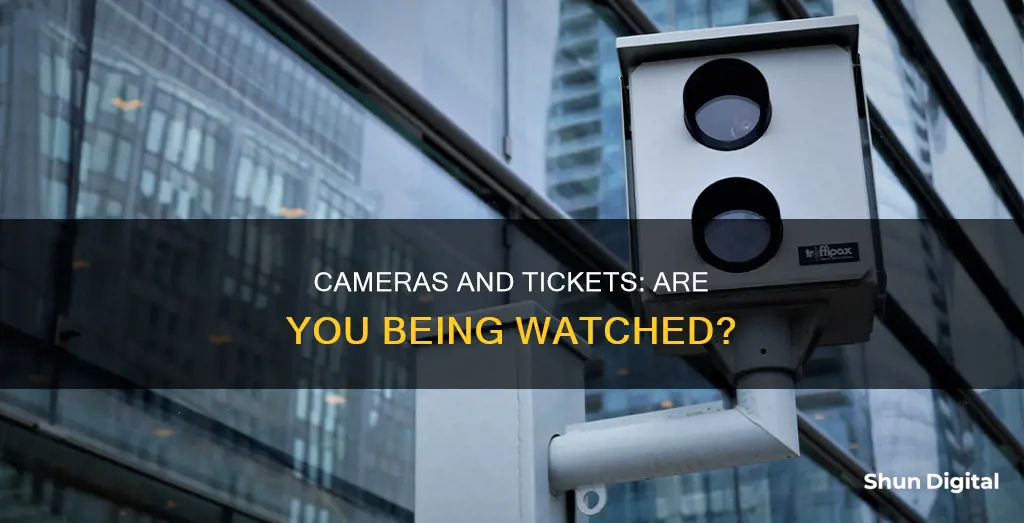
Red light cameras are automated camera systems that can issue traffic tickets to cars that run red lights. While these cameras are banned in Texas, some drivers have reported receiving tickets in the mail. So, do cameras give tickets? The answer is yes, but it depends on the state and local laws. In some places, like Texas, you may not be required to pay a ticket issued by a camera. However, it's important to note that not all tickets are created equal, and there may be other consequences for not paying. It's always best to do your research and understand the specific laws and regulations in your area.
| Characteristics | Values |
|---|---|
| Can cameras give tickets? | Yes, automated camera systems can issue traffic tickets to cars that run red lights. |
| Do you have to pay the ticket? | It depends on the state. In Texas, for example, you don't have to pay a red light camera ticket, but you may receive a collection letter from a collection agency. |
| Can you dispute a ticket? | Yes, you can dispute a ticket on your own or with the help of a lawyer or a customer service product. |
What You'll Learn

Red light camera tickets in Texas
In 2019, Texas banned the use of red-light cameras, otherwise known as photographic traffic signals. This means that if you receive a red light camera ticket in Texas, you do not have to pay it. According to Texas Transportation Code 707.021, a local authority may not issue a civil or criminal citation or charge for a violation based on a recorded image produced by a photographic traffic signal enforcement system.
However, some cities in Texas were able to keep their red light cameras running due to a provision in the law that allowed them to finish their existing contracts with vendors. These cities include Balcones Heights, Humble, Leon Valley, and Amarillo. If you receive a ticket from one of these cities, it is considered voluntary to pay it.
If you do not pay a red light camera ticket in Texas, there may be some consequences. Your unpaid fine may be sent to a collection agency, and you could start receiving collection calls. Additionally, the Texas Department of Motor Vehicles or your local county assessor may prevent you from registering the vehicle that violated the law, known as a "scofflaw block". However, this block may only apply to online renewals through the DMV, and you may be able to register your vehicle in person at the county assessor-collector office.
It is important to note that unpaid red light camera tickets in Texas will not appear on your driving record or increase your insurance costs. Additionally, they cannot be reported to a credit bureau and will not affect your credit score. However, if your city had a red light camera contract before 2007, unpaid fines may still be reported to a credit bureau and impact your credit score.
Adjusting Your Camera: Master Similar Modes
You may want to see also

Traffic cameras vs. red light cameras
There are several types of cameras that monitor driving, including automated traffic enforcement cameras (ATECs) that issue penalties and violations, and others that fall into different categories.
Traffic Cameras
Traffic cameras, also known as traffic sensor cameras or traffic monitoring cameras, are video cameras that oversee general traffic conditions. They are usually placed on major roads such as highways, freeways, expressways, and arterial roads. They are often powered by mains electricity, solar panels, or other sources that are not susceptible to power outages. Traffic cameras are not the same as road safety cameras, which are set up in specific places to enforce adherence to the rules of the road.
Red Light Cameras
Red light cameras are automated ticket-issuing systems placed at busy intersections to detect when a motorist enters the intersection on a red light. If a violation is detected, the camera will take multiple images of the car during the process of the violation. Weeks later, the motorist will receive a ticket in the mail. Red light cameras are not issuing moving violations or criminal charges. From a legal standpoint, they are administrative violations like parking tickets. This expressly removes your right to face an accuser in court. If you receive a red light ticket and choose to ignore it, you will not be arrested – but it may be sent to a collection agency and damage your credit.
Speed Cameras
Speed cameras are similar in concept to red light cameras. They automatically detect and issue violations, except they do so for speeding violations. The placement of speed cameras is usually a little bit different than that of red light cameras. While red light cameras are usually found in heavily populated urban areas, speed cameras tend to be used on less populated back roads and in residential areas where residents have complained of frequent speeding. There are two types of speed cameras: fixed and mobile. Fixed speed cameras are mounted on elevated poles on the side of the road and are easy to spot due to their bulky weatherproof enclosures and external flashes. Mobile speed cameras are more difficult to notice since they are not permanently mounted to the ground and can be located on a camera tripod or inside a van.
Mastering Camera Modes: AV vs TV Settings
You may want to see also

Do you have to pay red light camera tickets?
Whether or not you have to pay a red light camera ticket depends on where you received the ticket. In some places, such as North Carolina, paying a red light camera ticket is voluntary and there are no repercussions for not paying. In other places, such as Illinois, red light camera tickets are enforceable and ignoring them can result in additional fines or vehicle seizure.
In general, red light camera tickets are considered legal and enforceable. However, there may be ways to avoid paying the fines if you understand the process and are comfortable with the associated risks. For example, in some jurisdictions, you may be able to file a "not pictured driver" affidavit stating that you were not the person driving the vehicle. It's important to note that providing false information to the police is a criminal offense. Additionally, you may be able to dispute the ticket if there was no clear signage indicating that the intersection was monitored by a red light camera.
It's always a good idea to review the specific laws and regulations in your area regarding red light camera tickets to understand your rights and responsibilities.
Understanding Servo Mode in Camera: Focusing on Autofocus Precision
You may want to see also

How to pay for a camera traffic ticket
In some places, traffic cameras are used to monitor and enforce road rules. These cameras can detect when road users break the law, for example, by speeding or running a red light, and can result in the issuance of a traffic ticket. While the consequences of not paying a camera traffic ticket vary by location, it is generally advisable to pay any fines incurred to avoid potential legal repercussions. Here are some steps and considerations on how to pay for a camera traffic ticket:
Understanding the Ticket:
First, carefully review the ticket you received. Different locations have varying rules regarding camera-issued tickets. For example, in some places, you must be driving at least 10 miles per hour over the speed limit to receive a ticket, while other areas may have different thresholds. Understanding the specifics of your ticket will help you assess your options.
Evidence and Proof:
Camera-issued tickets typically use a photograph of your license plate as evidence of the violation. Review the evidence provided with the ticket to assess the validity of the claim. In some cases, you may be able to contest the ticket if you believe you were not in violation of any traffic laws.
Payment Options:
The process for paying a camera traffic ticket may vary depending on the issuing authority. Some common methods of payment include:
- Online payment portals: Many jurisdictions offer the convenience of paying tickets online through their official websites. You may need to create an account or provide specific information, such as the ticket number, to initiate the payment process.
- Mail: In some cases, you may be able to mail a cheque or money order to the address provided on the ticket. Ensure that you include the appropriate payment details, such as a citation or reference number, to ensure the payment is correctly applied.
- In-person payment: Depending on your location, you may be able to pay the fine in person at a designated office or courthouse. This option may require you to present the physical ticket or provide other necessary information.
Contesting the Ticket:
If you believe you have grounds to dispute the ticket, you may have the option to contest it. Each jurisdiction will have its own process for contesting tickets, which may involve submitting evidence or attending a hearing. Carefully review the information on the ticket or the relevant government website to understand the specific procedure for your area.
Deadlines and Consequences:
Pay close attention to any deadlines specified on the ticket. Failure to pay or contest the ticket within the allotted time frame can result in additional penalties or fees. In some cases, unpaid tickets may be sent to collection agencies, affecting your credit score or resulting in civil liens against your license plates or vehicle registration. Understanding the potential consequences of non-payment is crucial in making an informed decision.
Location-Specific Considerations:
The consequences of not paying a camera traffic ticket vary by location. For example, in Texas, an unpaid red light camera ticket will not be reported on the vehicle owner's driving record, and an arrest warrant cannot be issued. However, the Texas Department of Motor Vehicles or local county assessor-collector can refuse to renew the vehicle's registration, a process known as a "scofflaw block." In Iowa, while camera-issued tickets are considered civil infractions and typically do not affect insurance rates, failure to pay can result in civil liens against your license plates or other collection actions by the city.
Charging Your Panasonic DMC-G6 Camera via USB
You may want to see also

How to dispute a camera traffic ticket
Check the Details
First, check the date, time, and location of the ticket. Camera tickets are sent to the car's owner, so confirm that you were driving the car when the ticket was issued. In some states, such as New York, the registered owner of the car is held liable, regardless of who was driving. However, in other states, the prosecutor must prove that you were driving the car in that location at the specified date and time.
Plead Not Guilty
You must plead not guilty if you want to dispute the ticket. This can often be done by mail or online, but in some cases, you may need to appear in traffic court. Check your citation and your deadline—you usually have 30 days to dispute the ticket.
Research Applicable Laws
Look for cases in your city or county about traffic cameras, and see if any appellate court decisions have ruled on their legality. Also, research other possible defenses. For example, some states have specific rules about where warning signs must be posted for traffic lights, or they may recognize a necessity defense for speeding.
Gather Evidence
Request copies of the photos that show your car and license plate. You can also request full maintenance records for the camera and the traffic light or speed monitoring system to establish that they were regularly monitored and maintained. If the accuracy of the camera wasn't tested shortly before your ticket was issued, the photo may be unreliable as evidence.
Attend the Hearing
Arrive at the courthouse on the day of your hearing with copies of any documents you intend to use as evidence. Treat the judge and courthouse staff with respect, and listen quietly while the prosecutor presents their case.
Present Your Defense
You can challenge the admissibility of the photograph as hearsay, or assert your right to confront witnesses. Dispute the authenticity of the photograph if no one from the company that maintains the camera shows up to testify. Additionally, if none of the photos clearly show you driving, you can argue that the prosecution cannot prove it was you.
Spy Cameras: How Long Does the Charge Last?
You may want to see also
Frequently asked questions
No, you do not have to pay. In 2019, Texas banned the use of photographic traffic enforcement systems. However, you may still receive a ticket in the mail, and if you don't pay, it will be sent to a collection agency.
If you don't pay your ticket, it will be sent to a collection agency, and you may begin receiving calls from them. Additionally, the Texas Department of Motor Vehicles or your local county assessor-collector may refuse to register your vehicle, a process known as a "scofflaw block".
No, by state law, unpaid red light camera fines cannot be reported to a credit bureau. However, if the city where you received your ticket had a red light camera contract before 2007, your unpaid fines may be reported to a credit bureau.
Yes, you can dispute your ticket without hiring a lawyer. You can use a platform such as DoNotPay, which has helped over 60,000 drivers dispute their tickets.







